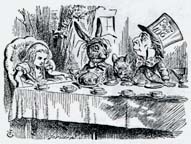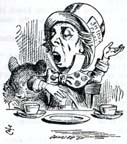When Alice finds herself lost in a strange world of stature-altering consumables and hookah-smoking caterpillars, the foreignness of the place is just as pronounced in its language as it is in its peculiar places and characters. Informed by her education and upbringing, Alice's speech follows patterns widely accepted by her own society; however, when she falls into Wonderland she is confronted by a new set of rules that govern words”usage and meanings. At the Mad Hatter's tea party, Carroll tests Alice's preconceptions regarding communication by confronting her with the Dormouse's nonsensical tale:

“One, indeed!”said the Dormouse indignantly. However, he consented to go on. “And so these three little sisters — they were learning to draw, you know — '
“What did they draw?” said Alice, quite forgetting her promise.
“Treacle,”said the Dormouse, without considering at all this time. . . .
Alice did not wish to offend the Dormouse again, so she began very cautiously: “But I don't understand. Where did they draw the treacle from?”
“You can draw water out of a water-well,”said the Hatter; “so I should think you could draw treacle out of a treacle-well — eh, stupid?”
“But they were in the well,”Alice said to the Dormouse, not choosing to notice this last remark.

“Of course they were,” said the Dormouse; “ — well in.”
This answer so confused poor Alice, that she let the Dormouse go on for some time without interrupting it.
“They were learning to draw,”the Dormouse went on, yawning and rubbing its eyes, for it was getting very sleepy; “ and they drew all manner of things — everything that begins with an M — ”
“Why with an M?” said Alice.
“Why not?” said the March Hare.
Alice was silent.
The Dormouse had closed its eyes by this time, and was going off into a doze; but, on being pinched by the Hatter, it woke up again with a little shriek, and went on: `“ ssm that begins with an M, such as mouse-traps, and the moon, and memory, and muchness — you know you say things are "much of a muchness" — did you ever see such a thing as a drawing of a muchness?”
“Really, now you ask me,” said Alice, very much confused, `I don't think — '
“Then you shouldn't talk,” said the Hatter.
Alice tries to piece together the Dormouse's story with the logic she has carried with her from the real world, a language that does not translate well into the apparent madness that the Hatter and the March Hare speak fluently. She interprets the verb "draw" in the artistic sense, whereupon the Dormouse quickly flips its meaning to the physical act of pulling some substance from a container. Nevertheless, Alice immediately preoccupies herself with piecing together the details of the story, and is faced with the paradox of the sisters drawing treacle from the very well in which they are presumably living. The "well" is both a location and a container, and the Dormouse soon adds another layer of depth as he tags on " — well in," describing the condition of the sisters within the well. Alice, as a child, tries her best to process what she hears in the way that she is taught to understand language, but is unable to connect with the Wonderland language that works against the forms and logic of the real world.
Instead of being concerned with the message words carry as a part of phrases and sentences, Carroll unlocks words from their contexts and gives them an identity of their own; in Wonderland, "well" is as much a condition as a thing, no matter what words form a sentence around it. It has substance beyond its context, and the Dormouse moves it freely from one context to the next as he builds a story that becomes more about the relationship between words and their meanings than it is about three sisters living in a treacle well.
Alice's attempts to engage in conversation using set phrases and common expressions are often met with terse responses that derail her intentions, questioning how such expressions came to be and why the words within them have lost some (if not all) of their meanings. Though Alice is only trying to express her opinion when she says "I don't think," the Hatter's interrupting statement "Then you shouldn't talk," frames her postulation as a complete statement. As its own statement, the phrase takes on a new fullness and Carroll forces his audience to consider the words in a new context. We, as an audience, find humor in the Hatter's antics because Carroll illustrates the absurdity within everyday speech, but at the same time we are shown the life and freshness within phrasings often uttered without second thought. There is something poetic about tearing socially-accepted expressions from their concepts to grant them new life, and while the Mad Hatter and his tea party guests are most certainly mad from an outsider, it appears that some method does lie at the core of their way of thinking.
Questions
1. Did the critical response at the time Alice's Adventures in Wonderland and Through the Looking Glass were published focus more on its various social commentaries, its psychological study of children and how they experience the world, or for its exploration of the boundaries of language and the composition of everyday speech?
2. What were some of Carroll's specific interests as a logician? Did he ever conduct studies of language similar to his theorizing in his literary works?
When the Dormouse lists off the mash-up of M's, “...such as mouse-traps, and the moon, and memory, and muchness — you know you say things are ‘much of a muchness&rwquo; — did you ever see such a thing as a drawing of a muchness?” (Alice's Adventures in Wonderland, Ch. VII), is it simply more absurdity meant to confuse Alice? Does Carroll attach any significant meaning to presenting the words in this manner? Perhaps it has something to do with the substance of the words themselves. (See the Jabberwocky discussion and questions below)
3. In the beginning of Through the Looking Glass, Alice encounters a poem called “Jabberwocky,” whose words are just as unintelligible backwards as forwards:
'Twas brillig, and the slithy toves
Did gyre and gimble in the wabe;
All mimsy were the borogoves,
And the mome raths outgrabe.
Carroll crafts a poem almost entirely out of made-up words, yet despite doing so is able to convey a emotion and create narrative; this effect is essentially the opposite of the breakdown of common idioms in Alice's conversations, in which words lose their individual meaning as a part of a particular expression. He plays with the materiality of language, emphasizing the meaning conveyed by the shape and sound of words.
What is it about how we process language that gives sense to a poem like "Jabberwocky" in our minds? While we are able to process and enjoy this Wonderland language, does Alice ever accept it, or even make use of its illogic in her own thinking? What does it mean that she consistently rejects the Wonderland way of thinking and yet still falls into traps of not fully understanding her own system of language and logic?
Last modified 19 March 2010